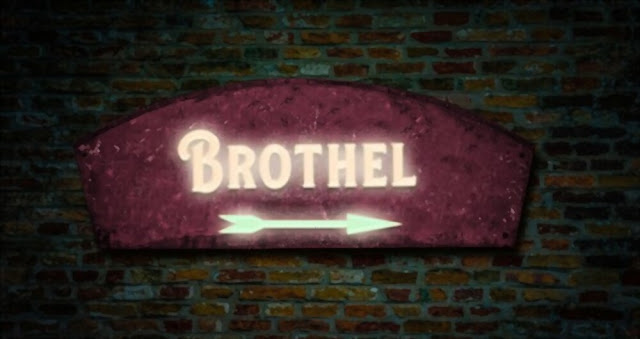Introduction
As we delve into the lesser-known realms of history, we often discover intriguing tales that leave us questioning our understanding of human culture. The world of brothels throughout history is one such area that offers a fascinating glimpse into human behavior, morality, societal norms, and even architecture. Despite their controversial nature, it is undeniable that these establishments have had a significant impact on our society and our collective human story. Through this exploration, we aim to shed light on the intricate history of brothels, and the cultural impact they have had throughout the ages.
Brothels Through The Ages
Unwrapping the earliest history of brothels transports us to the classical civilizations of Ancient Greece and Rome, where these establishments were not only legal, but they were also accepted and regulated. Both empires had specific regions known for sex work, such as the port area of Piraeus in Greece and the Subura district in Rome. During these times, brothels, or 'lupanars', were seen as necessary establishments for satisfying natural human desires. Even famous philosophers like Solon initiated state-run brothels at affordable prices to cater to all classes of society.
As we march into the Middle Ages and the Renaissance period, the situation changes dramatically. The rise of religious thought led to a moral conflict with the existence of brothels. Yet, in practice, they continued to thrive, often under the quasi-legal concept of 'stewhouses.' In countries like England, these establishments were prevalent and often protected by municipal legislation.
The 19th and early 20th centuries saw another significant transformation in the nature of brothels, especially in countries like Australia. The Gold Rush era led to a sudden influx of population, creating a demand for entertainment and leisure activities, including sex work. Brothels popped up all over in areas like Kalgoorlie and Coolgardie, illustrating the essential role they played in these burgeoning communities.
The Role And Impact Of Brothels In Society
Beyond their basic function, brothels throughout history have served several other roles within their communities. In many societies, they provided a substantial economic input through licensing fees, fines, and their general circulation of money. During the middle ages, some brothels even contributed towards public projects, like building roads and canals.
Needless to say, these institutions also significantly influenced societal norms and values. They shaped ancient perceptions of gender roles, and often acted as the epicentre of societal views on sexuality. This often collides with our contemporary perspective, as we become more aware of the potential exploitation that these establishments can entail.
Architecture Of Brothels
The architecture of brothels provides an extra dimension of fascination, as their design often reflected their function. In ancient Rome, brothels were often small, dimly lit cubicles with suggestive decor to attract clients. Conversely, during the renaissance, brothels often were often grand, multistory buildings designed to offer a lavish experience.
Distinctively, during the 19th century, the establishment of ‘high-end’ and 'low-end' brothels became more noticeable. The architecture reflected this class divide quite significantly. High-end brothels — often known as parlour houses — were luxuriously decorated, with several rooms to entertain clients. Conversely, ‘cribs,' the cheaper alternative, were typically single-room establishments often located in narrow lanes and backstreets.
Iconic Brothels And Their Stories
Throughout the ages, some brothels have achieved a level of notoriety or fame due to various reasons. From the luxurious One Eyed Jacks in America’s Old West to the infamous Love Ranch in modern-day Nevada, these establishments offer numerous tales of intrigue, scandal, and survival against societal norms. Their stories often reveal layered socioeconomic circumstances, driven by human longing and economic desperation.
The Evolution Of Brothel Governance
From a legal perspective, the history of brothel governance has been a confusing saga of legislation, social norms, religious influence, and societal need. Early systems in Rome and Greece were fairly straightforward, with state-controlled brothels operating alongside licensed and taxed private establishments. However, this clarity dissolves into muddier waters in the Middle Ages and beyond. Oscillating between tolerant regulation and stringent suppression, the governance of brothels often reflected societal attitudes towards broader concepts of morality and sexuality.
The Impact Of Brothels On Artistic Expression
The influence of brothels extends beyond societal norms into the realm of the arts. Many brothels throughout history served as meeting places for artists, writers, and thinkers. This is noticeably reflected in the works of Toulouse-Lautrec, who was a regular in the infamous Moulin Rouge, and his paintings often portray the lives of the people in these establishments.
Similarly, numerous books and poems — from Alexandre Dumas' "The Lady of the Camellias" to numerous noir films— find their setting in brothels. Whether the portrayal is realistic or romanticized, these works of art offer a glimpse into the lives entwined with these establishments throughout history.
Brothels Today: Modern Perspectives And Legacies
The cultural legacy of brothels persists in today's society. Modern perspectives on brothels and sex work are complicated, varying greatly between societies and even between different segments of the same society. Still, the influence of historical establishments is unmistakable in shaping these views, whether it is in societies that seek to regulate this industry, or ones that enforce strict laws against it.
Conclusion
In analyzing the history of brothels, we venture into a realm that challenges our traditional perceptions of morality, society, and even architecture. By unraveling their evolution, we gain a deeper understanding of the human cultural experience, exposing both societal progression and regression. It's important to observe these establishments with an unbiased eye, as they provide crucial historical data that unravels the complex interplay between economy, society, governance and human nature.

.jpg)






.jpg)
No comments:
Post a Comment